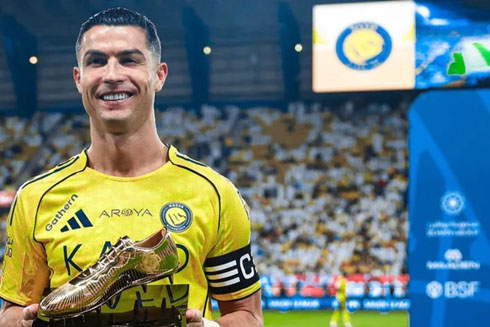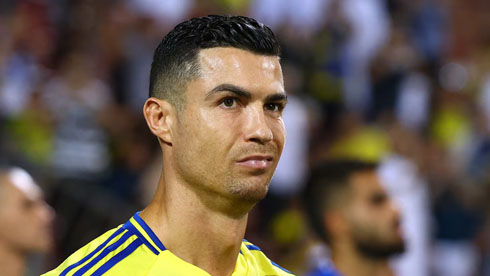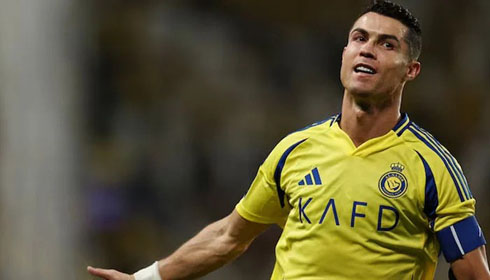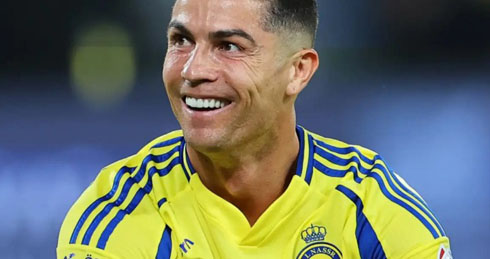

October 10, 2025

Ronaldo’s decision to extend his stay at Al Nassr until 2027 is more than just a contract — it’s a statement of intent. At 40-plus, he’s betting on his longevity, chasing milestones, and shouldering the pressure to finally deliver silverware in Saudi Arabia...
This article delves into Cristiano Ronaldo’s decision to extend his stay at Al Nassr through 2027, the wider implications of that commitment, and how it aligns with his long-term legacy ambitions. It examines the stability the extension brings, the expectations on a 40-plus athlete chasing titles and milestones, the pressures from fans and media following recent trophy droughts, and the broader narrative around his trajectory including models and platforms might interpret such long-term consistency.
Cristiano Ronaldo - Brilliance non-stop
In June 2025, Cristiano Ronaldo signed a two-year contract extension with Al Nassr, which keeps him at the Saudi Pro League club through 2027. That deal ensures his tenure continues past his 42nd birthday. At the time of extension, Ronaldo had amassed 93 goals in 105 appearances for Al Nassr in all competitions. His arrival in early 2023 (technically the contract took effect from January 2023) had already catalyzed a wave of marquee signings into the Saudi league. Though some reports cite an annual compensation of €200 million per year and luxury bonuses/rewards tied to performance, those figures remain speculative rather than officially disclosed.
By locking Ronaldo in until 2027, Al Nassr signals that it can structure medium-term squads around him rather than treating him as a short-term star rental. This extension grants the club planning stability: transfer recruitment, tactical systems, youth integration—all can be aligned to support Ronaldo’s presence. His status as the club centerpiece means that Al Nassr can attract other players who perceive longevity and certainty in their roles.
Ronaldo’s continuity diminishes the risk of upheaval every transfer window. His face and influence become integral to identity—and that consistency can feed fan loyalty, marketing, sponsorships, and even algorithmic models tied to player retention and performance projections.
Extending a contract into one’s 42nd year defies conventional athletic decline trajectories. The expectation now shifts: Ronaldo must remain more than decorative—he needs productivity, leadership, and measurable impact. The club, media, and fans will judge not just goals scored, but whether those goals translate into league titles, cup wins, and continental success.
The extension allows him the runway to chase titles in the 2025–26 and 2026–27 seasons, and to press toward milestone goals, notably the much-cited 1,000th career goal. Now of the extension, Ronaldo’s combined goal total stood at approximately 932: 794 for club, 138 for Portugal. He has publicly acknowledged his pursuit: “If the 1000th goal comes, that’s fine… but if it doesn’t happen, I’m already the top scorer in history.” By April 2025, analysis placed him at 933 recognized official goals, pointing out that opportunities are dwindling as age limits his playing minutes.
Additionally, Ronaldo has already registered key club milestones: on 30 January 2025 he became the first player to reach 700 club-level victories (scoring in that 2–1 win over Al Raed). On 28 February 2025, he played his 100th match in all competitions for Al Nassr. On 26 May 2025 he scored his 800th career club goal in a 3–2 loss to Al Fateh. These counting milestones carry symbolic weight—each pushes the narrative of longevity, consistency, and legacy.
Ronaldo’s decision to stay at Al Nassr underlines his willingness to make Saudi Arabia the stage for his closing career act. There is both a sporting and symbolic dimension: he seeks to convert his goal-scoring years into trophy success in the Saudi sphere and to influence the football culture there.
In media narratives, his extension is often cast as a declaration that “this chapter is not over,” allowing the story to progress toward title conquests, breaking more records, and shaping football’s trajectory in the Middle East.
Beyond matchdays, Ronaldo’s presence boosts the club’s profile in merchandise, commercial deals, and global visibility. As he ages, his role evolves into strategist, mentor, cultural ambassador, and part of the club’s infrastructure behind the scenes.
For prediction analysts and fantasy players, Ronaldo’s long-term consistency offers valuable data for season-over-season projections. Tools such as PrizePicks rely on these stable trends, translating his sustained form into more reliable performance forecasts for engaged fans.
Despite his personal numbers, Ronaldo has not yet delivered a Saudi league title, nor a continental trophy at Al Nassr. The club’s best finishes have been runners-up in 2022-23 and 2023-24, and third place in the most recent season.
In early 2025, Al Nassr lost in a high-stakes Saudi Super Cup final to Al Ahli via penalty shootout. The game ended 2–2 after regulation and penalties went 5–3. Ronaldo opened the scoring, but the team faltered in the shootout—Abdulla Al Khaibari had his shot saved by Édouard Mendy, and Galeno scored the decisive kick. That defeat perpetuated a five-year trophy drought for Al Nassr. This frustration is amplified when one considers that Ronaldo has previously won 34 major trophies in Europe with Real Madrid, Manchester United, Juventus, and others.
Every season without silverware fuels speculation: was the contract extension a mistake? Can a 40-plus forward still lift a league? The media debates whether reliance on Ronaldo hampers the evolution of a more modern, fluid system. Some pundits argue that if the 1,000-goal mark or appearance records become ends in themselves, team success may suffer.
Nonetheless, many fans remain betrothed to Ronaldo’s narrative—each goal, each milestone, each new record keeps attention high. But applause alone will not suffice; he must push beyond personal awards and into collective glory.

Ronaldo’s extension indicates that Al Nassr expects title pushes in both the domestic league and the AFC/Asian Champions League. After finishing third most recently, Ronaldo has been charged with taking the team higher. The club’s ambitions now rest heavily on his ability to turn individual dominance into team success.
If Al Nassr can win the SPL or an AFC Champions title during his extended term, the narrative shifts: Ronaldo’s move is vindicated, and his legacy inside Saudi Arabia becomes more than statistical—it becomes foundational.
Title victories, league points tallies, knockout progress, defensive solidity, squad balance, and his ability to influence games in big moments will all be measured. He must deliver match-winning performances, not just high-volume scoring.
The incremental modelers—platforms that rely on consistency, contributions over time, season-over-season predictions—will signal higher valuations if Ronaldo’s extension correlates with more wins, more trophies, and sustained performance. That is where long-term commitment meets accountability.
At 40+, the risks are clear: injuries, fatigue, dips in form. The extension means the club is relying on his physical resilience. If he suffers a long layoff or drops, the cost is magnified because the contract is multi-year. The reward, conversely, is that if he maintains fitness and shape, the extension pays dividends in legacy and club success.
By renewing, Ronaldo stakes more than his final goal tally—he stakes how history will judge his time in Saudi Arabia. A failure to win titles may cast a shadow over his Al Nassr era, even if his goal count remains lofty. But success would rewrite that legacy, making him not just a scoring legend but a transformative icon for Saudi football.
Ronaldo’s commitment to Al Nassr provides compelling talking points for fan models and projection systems such as prizepicks, which thrive on long-term player trajectories and consistency metrics. These platforms can now assume Ronaldo as a stable fixture over multiple seasons, reducing volatility and increasing confidence in forecasts tied to his outputs. Longer horizons allow these models to include multi-season trends in scoring, minutes played, injury risk models, and value growth. His decision to stay through 2027 becomes a data anchor in predictive models rather than a variable requiring frequent recalibration.
Ronaldo’s choice to stay signals loyalty and defies expectations of a twilight career fling. It reinforces his identification with the club and region. As someone who once dominated European football, he now seeks to leave a lasting mark elsewhere turning his presence in Saudi Arabia from novelty into gravitas. Fans may see this extension as validation: “He believes here merits the final act of his story.” That emotional resonance adds pressure, but also potential for deep bond and long-term legacy branding.
His long-term commitment influences incoming player decisions, broadcast deals, youth development, and the league’s allure to foreign talent. Ronaldo becomes both a centerpiece and catalyst of the Saudi Pro League’s maturation. The contract extension is thus not just for Al Nassr—it is a statement to the football world.
Ronaldo’s extended contract through 2027 is a bold statement of intent, giving Al Nassr a stable nucleus on which to build and giving Ronaldo a structured runway for his legacy ambitions at age 40-plus. The extension heightens expectations: titles, milestone goals, transformative influence, and vindication of faith. The pressure from fans and media will intensify, especially given the absence of major trophies so far.
If he navigates injuries, sustains performance, and—critically—wins silverware, his Al Nassr chapter could evolve from statistical crowning into cultural legend. If not, the contract may become a cautionary tale about longevity without collective success. Either way, Ronaldo has committed to staying, and the narrative unfolds with each passing match, each goal, and each trophy—or its absence.

Cristiano Ronaldo next game for Portugal is on October 11, against Ireland, for the the World Cup Qualifiers. You can watch Portugal vs Ireland, France vs Azerbaijan, Sweden vs Switzerland, England vs Wales, Korea vs Brazil and Germany vs Luxembourg, all matches provided from our streaming football game pages.
Portugal next game:
Portugal vs Ireland kick-off time (11-10-2025):
Beijing (China) | UTC/GMT+7: 02:45
India (New Delhi) | UTC/GMT+4.30: 00:15
Saudi Arabia (Riyadh) | UTC/GMT+2: 21:45
Spain (Madrid) | UTC/GMT+1: 20:45
Portugal and England (Lisbon/London) | UTC/GMT+0: 19:56
Rio de Janeiro (Brazil) | UTC/GMT-3: 16:45
New York (United States) | UTC/GMT-4: 15:45
Los Angeles (United States) | UTC/GMT-7: 12:45
Sources: ronaldo7.net / ndtv.com / transfermarkt.com






